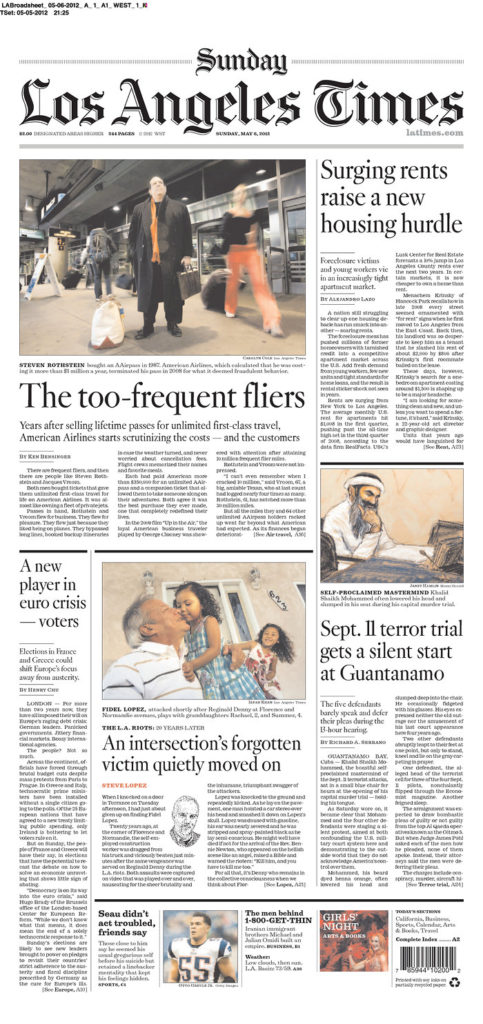
When I am in California, the Los Angeles Times is a critical component of my breakfast each morning. This morning, I was pleasantly surprised to find a fascinating article on American Airlines’ fight against alleged abusers of their AAirpass program. The story is well worth reading.
In 1981, American Airlines introduced a pre-paid AAirpass option, including an option for unlimited lifetime travel for $125,000 (about $300,000 in 2012 dollars). That price went up to high as $3mn (offered exclusively in the Neiman Marcus Christmas catalog) in 2004, before AA realized this wasn’t really a money-making proposition.
Here’s an excerpt from the article that I found particularly interesting:
…The unlimited passes were bought mostly by wealthy individuals, including baseball Hall-of-Famer Willie Mays, America’s Cup skipper Dennis Conner and computer magnate Michael Dell.
Mike Joyce of Chicago bought his in 1994 after winning a $4.25-million settlement after a car accident.
In one 25-day span this year, Joyce flew round trip to London 16 times, flights that would retail for more than $125,000. He didn’t pay a dime.
“I love Rome, I love Sydney, I love Athens,” Joyce said by phone from the Admirals Club at John F. Kennedy International Airport in New York. “I love Vegas and Frisco.”
Rothstein had loved flying since his years at Brown University in Rhode Island, where he would buy a $99 weekend pass on Mohawk Air and fly to Buffalo, N.Y., just for a sandwich.
He bought his AAirpass in 1987 for his work in investment banking. After he added a companion pass two years later, it “kind of took hold of me,” said Rothstein, a heavyset man with a kind smile.
He was airborne almost every other day. If a friend mentioned a new exhibit at the Louvre, Rothstein thought nothing of jetting from his Chicago home to San Francisco to pick her up and then fly to Paris together…
All I can say is that I wish I had one! According to the story, only 64 people do. Tickets under the AAirpass program even earn AAdvantage miles!
With a program like this, the potential for abuse, namely selling companion seats to strangers, is substantial. My first thought was that American was right to crack down on abusers and perfectly justified in canceling AAirpasses of those who broke the rules.
But that did not exactly happen:
In the 2009 film “Up in the Air,” the loyal American business traveler played by George Clooney was showered with attention after attaining 10 million frequent flier miles.
[Steven] Rothstein and [Jacques] Vroom were not impressed.
“I can’t even remember when I cracked 10 million,” said Vroom, 67, a big, amiable Texan, who at last count had logged nearly four times as many. Rothstein, 61, has notched more than 30 million miles…
Meet Steven Rothstein.
Raised just miles from American’s Fort Worth headquarters, Bridget Cade started in its reservations department in 1990. In 2007, she was promoted to the elite revenue integrity team, charged with rooting out passengers, travel agents and others suspected of cheating the airline.
Her first big job was to investigate AAirpass users.
Meet Bridget Cade.
Cade was assigned to find out whether any AAirpass holders were violating the rules, starting with those who flew the most.
She pulled years of flight records for Rothstein and Vroom and calculated that each was costing American more than $1 million a year.
Rothstein, she found, would sometimes pick out strangers at the airport and give them surprise first-class upgrades with his companion pass. Once he flew a woman he’d just met in New Delhi to Chicago, a lift American later valued at nearly $7,500.
There was nothing in the AAirpass terms prohibiting that. But Cade considered the habit striking in light of something else she found. Rothstein made 3,009 reservations in less than four years, almost always booking two seats, but canceled 2,523 of them.
To Cade, this was evidence that Rothstein reserved flights he never intended to take. It also allowed him to hold seats until the last minute and offer them to strangers, she said later in court depositions, preventing American from selling them. Cade decided it was fraud and grounds for revocation.
On Dec. 13, 2008, Rothstein and a companion checked in at Chicago O’Hare International Airport for a transatlantic flight. An American employee handed him a letter, which said his AAirpass had been terminated for “fraudulent behavior.”
That doesn’t seem like fraud to me. It sounds much more like AA just got tired of paying for his extravagant travel habits. Rothstein sued and the article suggests the case has not been resolved:
Rothstein moved to New York in 2009 and works for a trading firm. His office is crammed with family photos and reminders of exotic locales he visited flying American. Among his possessions is a1998 letter on company stationery from Bob Crandall, with whom Rothstein once flew on the supersonic Concorde.
“I am delighted that you’ve enjoyed your AAirpass investment,” the executive wrote. “You can count on us to keep the company solid, and to honor the deal, far into the future.”
What an ironically fitting ending.




Regarding Rothstein, he made reservations under the psuedonym “Bag Rothstein” which seems to me he never intended for the seat to be occupied thus costing AA revenue. Technically this may be within his right but it certainly appears to be abusive. Give people an inch, they will take a mile…
Kudos, Matthew, for your sense of irony in your take on this story.
Gotta love hyper-capitaism. “A deal’s a deal, when it suits us. However, if you’re getting the better end of the deal, then you’re a thief and we’re investigating you “